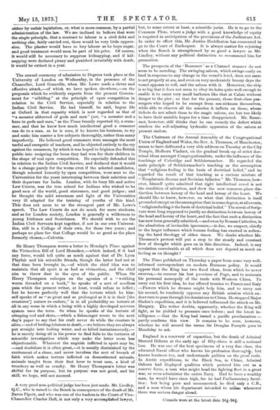The Chairman of the Annual Assembly of the Congregational Union
of England and Wales, the Rev. A. Thomson, of Manchester, seems to have delivered a very able address on Tuesday at the City Temple, Holborn Viaduct, on the gradual break-up of strict doc- trinal ideas amongst Congregationalists, under the influence of the teachings of Coleridge and Schleiermacher. He regarded the main principle of Schleiermacher's teaching as the assumption that "religious feeling is the basis of doctrinal belief," and he regarded the result of that teaching as a curious mixture of " Neoplatonic dreams and Socinian fallacies." Mr. Thomson, how- ever, himself quite admitted that right intellectual creed is not the condition of salvation, and drew the now common-place dis- tinction between heresy of the head and heresy of the heart. We should like to know, however, on what that distinction is itself grounded except on the assumption that in some degree, at all events, " religious feeling is the basis of doctrinal belief." The words of Scrip- ture were long supposed to justify no distinction between heresy of the head and heresy of the heart, and the fact that such a distinction has now been generally admitted,—and even by Roman Catholics, in the absolution of invincible ignorance,—is due, we suspect, chiefly to the larger influence which human feeling has exerted in soften- ing the hard theology of olden times. We doubt whether Mr. Thomson's protest will put a stop to the steady and constant flow of thought which goes on in this direction. Indeed, is any revelation conceivable at all which does not depend as much on feeling as on thought?


































 Previous page
Previous page